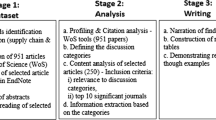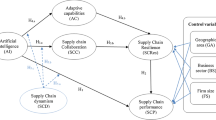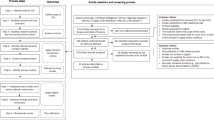Abstract
Supply chains in the globally interconnected society have complex structures and thus are susceptible to disruptions such as natural disasters and diseases. The impact of the risks and disruptions that occur to one business entity can propagate to the entire supply chain. However, it has been proposed that cooperation amongst business entities can mitigate the impact of the risks. This paper aims to investigate the value of information sharing in a generalized three-echelon supply chain. The supply chain model is built in a system dynamics software, and three decision-making rules based on different levels of information sharing are developed. Performances of the three ordering policies with shock applied are compared. The results of the experiments prove the value of information sharing in the supply chain when shock exists.











Similar content being viewed by others
References
Banerjee A, Burton J, Banerjee S (2003) A simulation study of lateral shipments in single supplier, multiple buyers supply chain networks. Int J Prod Econ 8182:103–114. doi:10.1016/S0925-5273(02)00366-3
Barlas Y, Gunduz B (2011) Demand forecasting and sharing strategies to reduce fluctuations and the bullwhip effect in supply chains. J Oper Res Soc 62(3):458–473. doi:10.1057/jors.2010.188
Carvalho H (2011) Resilience index: proposal and application in the automotive supply chain. In: Proceedings of the 18th EUROMA conference, Cambridge, pp 3–6
Chopra S, Sodhi M (2012) Managing risk to avoid supply-chain breakdown. MIT Sloan Management Review (Fall 2004)
Deleris LA, Erhun F (2005) Risk management in supply networks using monte-carlo simulation. In: Simulation conference, 2005 proceedings of the winter, IEEE, pp 7–pp
Fiala P (2005) Information sharing in supply chains. Omega 33(5):419–423. doi:10.1016/j.omega.2004.07.006
Hendricks KB, Singhal VR (2005) Association between supply chain glitches and operating performance. Manag Sci 51(5):695–711
Hopp WJ, Iravani SMR, Liu Z (2012) Mitigating the impact of disruptions in supply chains. In: Gurnani H, Mehrotra A, Ray S (eds) Supply chain disruptions: theory and practice of managing risk. Springer, London, pp 21–49. doi:10.1007/978-0-85729-778-5_2
Johnson ME (2001) Learning from toys: lessons in managing supply chain risk from the toy industry. Calif Manag Rev 43(3):106
Li H, Lee LH, Chew EP, Lendermann P (2015) Mo-compass: a fast convergent search algorithm for multi-objective discrete optimization via simulation. IIE Trans 47(11):1153–1169
Li L (2002) Information sharing in a supply chain with horizontal competition. Manag Sci 48(9):1196–1212. doi:10.1287/mnsc.48.9.1196.177
Mohammaddust F, Rezapour S, Farahani RZ, Mofidfar M, Hill A (2015) Developing lean and responsive supply chains: a robust model for alternative risk mitigation strategies in supply chain designs. Int J Prod Econ. doi:10.1016/j.ijpe.2015.09.012
Mutallip A (2013) Deciding on parameter values of anchor and adjust heuristic in stock management. Ph.D. thesis, Boğaziçi University
Mutallip A, Yasarcan H (2014) Effect of lead time on anchor-and-adjust ordering policy in continuous time stock control systems. In: 32nd International conference of the system dynamics society, Delft
Priya Datta P, Christopher M, Allen P (2007) Agent-based modelling of complex production/distribution systems to improve resilience. Int J Logist Res Appl 10(3):187–203
Ren ZJ, Cohen MA, Ho TH, Terwiesch C (2010) Information sharing in a long-term supply chain relationship: the role of customer review strategy. Oper Res 58(1):81–93. doi:10.1287/opre.1090.0750
Sahin F, Robinson EP Jr (2005) Information sharing and coordination in make-to-order supply chains. J Oper Manag 23(6):579–598. doi:10.1016/j.jom.2004.08.007
Sawik T (2011) Selection of supply portfolio under disruption risks. Omega 39(2):194–208
Sawik T (2013) Selection and protection of suppliers in a supply chain with disruption risks. Int J Logist Syst Manag 15(2–3):143–159
Schmitt AJ, Singh M (2009) Quantifying supply chain disruption risk using monte carlo and discrete-event simulation. In: Winter simulation conference, winter simulation conference, pp 1237–1248
Schmitt AJ, Singh M (2012) A quantitative analysis of disruption risk in a multi-echelon supply chain. Int J Prod Econ 139(1):22–32
Schmitt AJ, Tomlin B (2012) Sourcing strategies to manage supply disruptions. In: Gurnani H, Mehrotra A, Ray S (eds) Supply chain disruptions: theory and practice of managing risk. Springer, London, pp 51–72. doi:10.1007/978-0-85729-778-5_3
Snyder LV, Shen ZJM (2006) Supply and demand uncertainty in multi-echelon supply chains. Submitted for publication, Lehigh University 15
Snyder LV, Atan Z, Peng P, Rong Y, Schmitt AJ, Sinsoysal B (2012) OR/MS modelsfor supply chain disruptions: a review. SSRN 1689882
Son JY, Orchard RK (2013) Effectiveness of policies for mitigating supply disruptions. Int J Phys Distrib Logist Manag 43(8):684–706
Spiegler VL, Naim MM, Wikner J (2012) A control engineering approach to the assessment of supply chain resilience. Int J Prod Res 50(21):6162–6187
Talluri SS, Kull TJ, Yildiz H, Yoon J (2013) Assessing the efficiency of risk mitigation strategies in supply chains. J Bus Logist 34(4):253–269
Tang O, Musa SN (2011) Identifying risk issues and research advancements in supply chain risk management. Int J Prod Econ 133(1):25–34
Tomlin B, Wang Y (2011) Operational strategies for managing supply chain disruption risk. In: Kouvelis P, Dong L, Boyabatli O, Li R (eds) The handbook of integrated risk management in global supply chains. John Wiley & Sons, Inc., Hoboken, NJ, pp 79–101. doi:10.1002/9781118115800.ch4
Wakolbinger T, Cruz J (2011) Supply chain disruption risk management through strategic information acquisition and sharing and risk-sharing contracts. Int J Prod Res 49(13):4063–4084
Wilson MC (2007) The impact of transportation disruptions on supply chain performance. Transp Res Part E Logist Transp Rev 43(4):295–320. doi:10.1016/j.tre.2005.09.008
Wu J, Zhai X, Zhang C, Liu X (2010) Sharing quality information in a dual-supplier network: a game theoretic perspective. Int J Prod Res 49(1):199–214. doi:10.1080/00207543.2010.508947
Yang T, Fan W (2016) Information management strategies and supply chain performance under demand disruptions. Int J Prod Res 54(1):8–27. doi:10.1080/00207543.2014.991456
Zhang F (2012) Supply contracting under information asymmetry and delivery performance consideration. In: Gurnani H, Mehrotra A, Ray S (eds) Supply chain disruptions: theory and practice of managing risk. Springer, London, pp 165–193. doi:10.1007/978-0-85729-778-5_7
Acknowledgments
This research was supported in part by the Logistics & Supply Chain Management Program in Supply Chain Risk Management (SERC 1124204049), funded by Agency for Science, Technology and Research (A*STAR) Singapore.
Author information
Authors and Affiliations
Corresponding author
Rights and permissions
About this article
Cite this article
Li, H., Pedrielli, G., Lee, L.H. et al. Enhancement of supply chain resilience through inter-echelon information sharing. Flex Serv Manuf J 29, 260–285 (2017). https://doi.org/10.1007/s10696-016-9249-3
Published:
Issue Date:
DOI: https://doi.org/10.1007/s10696-016-9249-3




